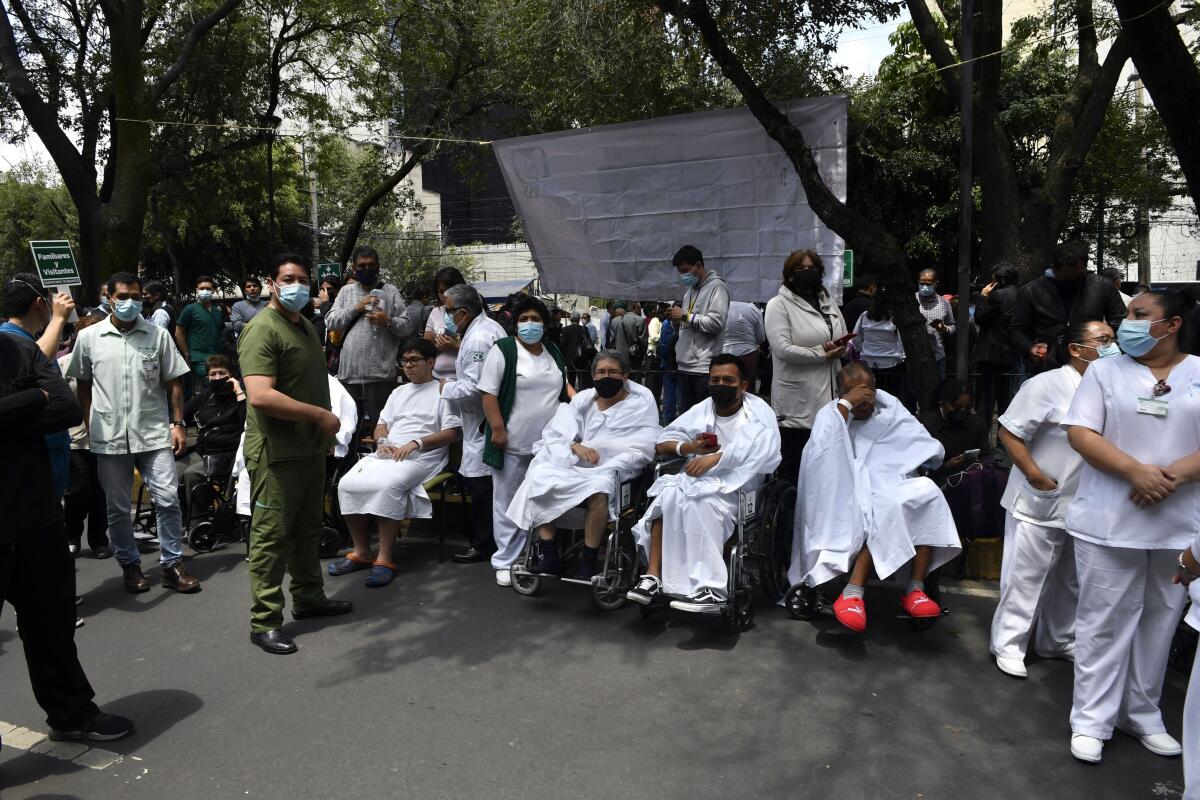Is Sept. 19 cursed in Mexico? There have now been three major earthquakes on that day

- Share via
MEXICO CITY — A powerful earthquake shook western and central Mexico on Monday — the anniversary of shakes that killed thousands in 1985 and hundreds in 2017.
Tens of thousands of fearful people poured into the streets in the capital and elsewhere as the ground began to shake at 1:05 p.m.
For a quake that the U.S. Geological Survey said was a magnitude 7.6 — Mexico’s National Seismological Service put it at 7.7 — the damage was surprisingly limited, with only one reported death.
That was likely because the epicenter is a sparsely populated region, 250 miles southwest of Mexico City in western Michoacán state, at a depth of 9.4 miles. The temblor was felt across 12 Mexican states, officials said.
It struck 46 minutes after a practice earthquake alarm sounded across Mexico City — an exercise that city officials now perform each Sept. 19.
It is a date that has achieved portentous status in Mexico.
The 1985 quake that day measured 8.1 and killed more than 10,000 people as hundreds of buildings collapsed. The death toll from the 7.1 quake in 2017 topped 360.
“I can’t believe that this happened again on Sept. 19!” said María Refugio Valdés, 55, a stay-at-home mother in Mexico City. “This time, at first I was scared, and then I began to cry. In 1985, I lost various family members.
“Thank God we lost none in 2017, and none this time. But it doesn’t seem possible! The same date.”
Many others wondered whether the date is cursed.
“It’s surreal how we live in this country with these earthquakes,” said Lourdes Trejo, 46, a nurse in Mexico City. “Maybe it’s a message: We shouldn’t do anything on Sept. 19!”
The timing was a major topic of conversation as people left their homes and gathered on the streets for protection.
“I don’t understand — why Sept. 19 again?” asked Mario Solís Flores, 39, a street vendor in the capital. “What is going on? Sept. 19? It’s something one can hardly believe.”
On Monday morning, before the quake struck, Mexican President Andrés Manuel López Obrador oversaw a ceremony in downtown Mexico City lowering a flag to half-staff for victims of the earthquakes of 1985 and 2017.
Several commemorations were still being held as the quake started — including a memorial Mass at the former site of the Rébsamen School, where 19 children and seven adults died in 2017. The school became a signature site of the tragedy and a symbol of corruption in building practices and inspections in the capital.
The school director was sent to prison after being convicted on manslaughter charges in connection with faulty construction at the school.
Mexico’s National Autonomous University declared that the occurrence of three earthquakes of greater than 7.0 magnitude was strictly a quirk, with no broader significance. “There is no scientific reason that explains” the coincidental timing, the university’s seismological division said on Twitter.
By midafternoon Monday, more than 200 aftershocks had been registered.
The sole death reported was a person hit by debris in a shopping center in the Pacific coast city of Manzanillo, according to a tweet by López Obrador. Footage from Manzanillo and elsewhere in the state of Colima showed damage to roofs, bridges and other structures.
In the neighboring state of Michoacán, authorities reported that more than 20 hospitals and clinics were among many buildings damaged.
Mexican authorities said they issued no tsunami warning but said tidal variations were expected.
Claudia Sheinbaum, the mayor of Mexico City, reported no major damage in the capital, though there were scattered power outages. Failing traffic lights caused jams on a number of streets, and some delays were reported on the city’s metro train network.
In Mexico City’s tree-lined Roma neighborhood, residents gathered outside their apartment buildings as they waited for the trembling to cease.
Paul Moch, 34, and his girlfriend, Jimena David, 31, had grabbed their 5-year-old dog, Senshi, and left their second-floor apartment with a black backpack full of earthquake supplies: a flashlight, face masks, an extra dog leash, a blanket and a first-aid kit.
“It felt ugly,” Moch said. “What I’ve learned from the past is that you don’t know when the peak will hit.”
Next to him, Rosario Guerrero, visiting Mexico City from Cuernavaca, carried a small white dog. Guerrero, 68, hugged a woman who was quietly crying.
“Just cry,” Guerrero told the frightened woman. “Cry to get rid of the tension.”
McDonnell is a staff writer and Sánchez a special correspondent. Staff writer Leila Miller and special correspondent Liliana Nieto del Río contributed to this report.
More to Read
Sign up for Essential California
The most important California stories and recommendations in your inbox every morning.
You may occasionally receive promotional content from the Los Angeles Times.













